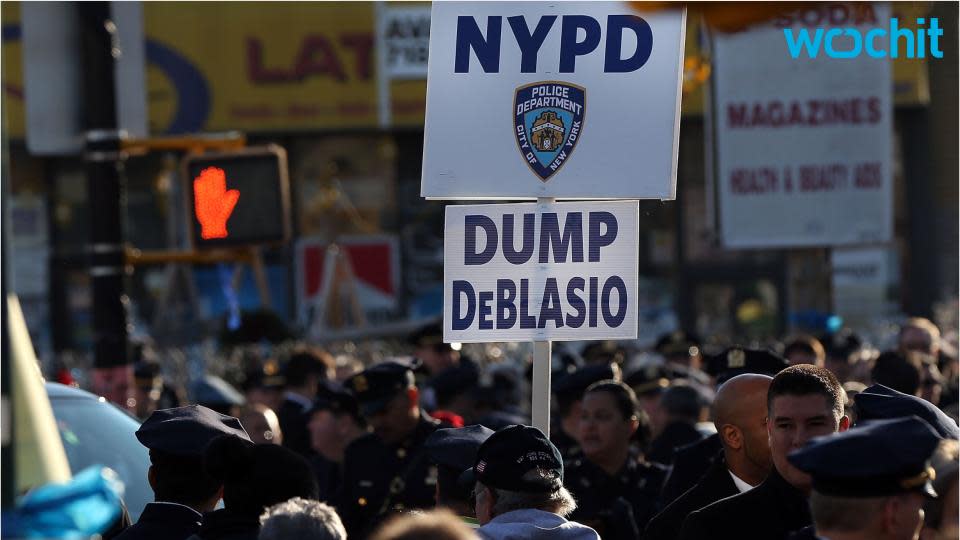Angry police shun NYC mayor at funeral for slain officer

By Jonathan Allen and Sebastien Malo NEW YORK (Reuters) - Tens of thousands of police from cities across the United States filled a New York City church and nearby streets on Saturday for the funeral of one of two policemen shot by a man who said he was avenging the killing of unarmed black men by police. The service for Rafael Ramos was one of the largest police funerals in the city's history, with U.S. Vice President Joe Biden among the dignitaries. But the tradition-bound ceremony was marked by an unusual protest against Mayor Bill de Blasio. As he rose to deliver the customary mayoral eulogy, thousands of uniformed officers outside silently turned their backs on him in a pointed display of disrespect as his image filled the large screens broadcasting the service. Angered by the mayor's qualified sympathy for nationwide demonstrations calling for police reform, some New York police officers had similarly shunned de Blasio as he arrived a week ago at the hospital where Ramos and his police partner, Wenjian Liu, were declared dead. "He believed in protecting others," de Blasio said as he stood behind Ramos' coffin, which was draped in the police department's flag and bathed in blue light, "and those who are called to protect others are a special breed." Singled out for their uniforms, the slaying of Ramos, 40, and Liu, 32, as they sat in their patrol car has become a rallying point for police and their supporters around the country, beleaguered by months of street protests accusing police of racist practices. Offering a counter-narrative to the anti-police chants at many protests, Vice President Biden made the first of several speeches that touched on the marked increase in the racial diversity of the city's police force, which only a few decades ago was almost entirely white. "I believe that this great police force of this incredibly diverse city can and will show the nation how to bridge any divide," Biden said during the service at Christ Tabernacle Church in the suburban Queens neighborhood in which Ramos lived with his wife, Maritza, and their two teenage sons. New York Governor Andrew Cuomo said the department had officers hailing from more than 50 different nations and included speakers of 64 languages. He went on to criticize some of the protesters who have held rallies in the city on a nearly daily basis. "The NYPD protected the right of free speech even though they themselves were the targets of false and abusive tirades by some," he said. SORROW MIXED WITH ANGER Streets outside the church were filled for blocks with neat, quiet crowds of officers in blue uniform, including delegations from Boston, Atlanta, St. Louis and New Orleans. Biden said some 25,000 people were thought to have come. Before joining the police department relatively late in his career, Ramos, known to his friends as Ralph, had worked as a school safety officer. "He knew how to handle people, and the younger guys looked up to him," said Bill Bratton, the city's police commissioner. A regular face as an usher at Christ Tabernacle, Ramos had nearly completed a course to become a police chaplain. Bratton, a far more popular figure among police than the mayor, announced that he had posthumously appointed Ramos to the position. The officers' killer, Ismaaiyl Brinsley, 28, was described by city officials as an emotionally troubled man, and fatally shot himself soon after the attack. Brinsley, who was black, had written online that he wanted to kill police to avenge the deaths of Eric Garner and Michael Brown - unarmed black men killed by white policemen in New York and Ferguson, Missouri, this summer. Their deaths and the decisions not to prosecute the officers responsible ignited nationwide protests, renewing a debate about race in the United States that has drawn in President Barack Obama. In his first year as mayor after campaigning for police reform, de Blasio has struggled to balance the interests of police critics who helped elect him and the officers who now work for him. This week, he was assailed by voices on both sides, with activists angered by his call, which they ignored, that they pause their protests. Ramos' family said the mayor was welcome at the funeral, but even many officers who did not turn their backs said they sympathized with the gesture. "A lot of people feel he has taken a side, and that side is not ours," a New York police officer said on condition that her name be withheld because of a department ban on unsanctioned media interviews. Patrick Lynch, president of the city's largest police union, said within hours of the deaths of Liu and Ramos that there was "blood on the hands" of the mayor. "We have to understand the betrayal that they feel," Lynch, in an interview outside the church with CNN, said of the officers' protest. "The feeling is real, but today is about mourning. Tomorrow is about debate." (Editing by Mark Heinrich and Dan Grebler)


